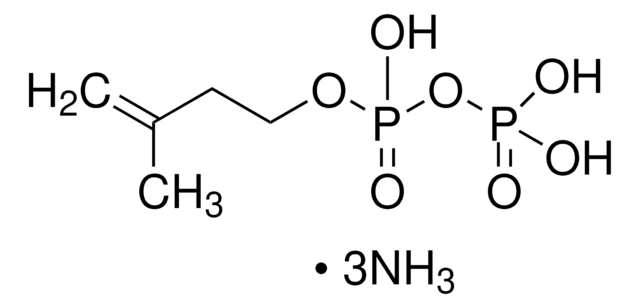MAK168
Pyrophosphate Assay Kit
sufficient for 200 fluorometric tests (Blue fluorescence)
Sinónimos:
High-Sensitivity Pyrophosphate Assay Kit
Iniciar sesiónpara Ver la Fijación de precios por contrato y de la organización
About This Item
Productos recomendados
usage
sufficient for 200 fluorometric tests (Blue fluorescence)
application(s)
cosmetics
food and beverages
detection method
fluorometric
storage temp.
−20°C
Categorías relacionadas
General description
Pyrophosphate (PPi) is produced by a number of biochemical reactions such as ATP hydrolysis, DNA and RNA polymerizations, cyclic AMP formation, and the formation of fatty acid-coenzyme A esters. It is hydrolyzed by inorganic pyrophosphatase. PPi is present in the blood and in the extracellular matrix of tissues.
Suitability
The Pyrophosphate Assay Kit provides a simple and direct microplate assay procedure for measuring pyrophosphate in a variety of samples.
Principle
The pyrophosphate concentration of a sample is determined by the use of a unique fluorogenic pyrophosphate sensor in which the presence of pyrophosphate results in the production of a fluorescent product (λex =316/λem = 456 nm) proportional to the pyrophosphate present. This assay is simpler and more robust than traditional enzyme-based methods and is ideal for screening enzyme activity or enzyme inhibitors.
signalword
Danger
hcodes
Hazard Classifications
Eye Dam. 1
Storage Class
10 - Combustible liquids
wgk_germany
WGK 3
flash_point_f
188.6 °F
flash_point_c
87 °C
Certificados de análisis (COA)
Busque Certificados de análisis (COA) introduciendo el número de lote del producto. Los números de lote se encuentran en la etiqueta del producto después de las palabras «Lot» o «Batch»
¿Ya tiene este producto?
Encuentre la documentación para los productos que ha comprado recientemente en la Biblioteca de documentos.
Los clientes también vieron
Jithesh Kottur et al.
Nucleic acids research, 46(12), 5875-5885 (2018-06-01)
DNA synthesis by DNA polymerases (dPols) is central to duplication and maintenance of the genome in all living organisms. dPols catalyze the formation of a phosphodiester bond between the incoming deoxynucleoside triphosphate and the terminal primer nucleotide with the release
Peiyi Zheng et al.
Journal of molecular biology, 431(4), 764-776 (2019-01-18)
Phosphopantothenoylcysteine (PPC) synthetase (PPCS) catalyzes nucleoside triphosphate-dependent condensation reaction between 4'-phosphopantothenate (PPA) and l-cysteine to form PPC in CoA biosynthesis. The catalytic mechanism of PPCS has not been resolved yet. Coenzyme A biosynthesis protein 2 (Cab2) possesses activity of PPCS
Pyrophosphate hydrolysis is an intrinsic and critical step of the DNA synthesis reaction.
Kottur J and Deepak T N
Nucleic Acids Research (2018)
Tyler M Weaver et al.
Proceedings of the National Academy of Sciences of the United States of America, 117(41), 25494-25504 (2020-10-02)
During DNA replication, replicative DNA polymerases may encounter DNA lesions, which can stall replication forks. One way to prevent replication fork stalling is through the recruitment of specialized translesion synthesis (TLS) polymerases that have evolved to incorporate nucleotides opposite DNA
Young-Joo Yi et al.
PloS one, 7(4), e34524-e34524 (2012-04-10)
Inorganic pyrophosphate (PPi) is generated by ATP hydrolysis in the cells and also present in extracellular matrix, cartilage and bodily fluids. Fueling an alternative pathway for energy production in cells, PPi is hydrolyzed by inorganic pyrophosphatase (PPA1) in a highly
Nuestro equipo de científicos tiene experiencia en todas las áreas de investigación: Ciencias de la vida, Ciencia de los materiales, Síntesis química, Cromatografía, Analítica y muchas otras.
Póngase en contacto con el Servicio técnico







